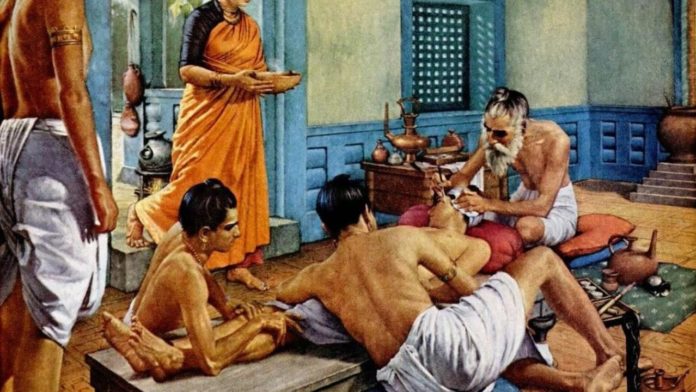Ayurveda, when translated, in a literal context, corresponds to the ‘science of life.’ It may also be defined as “the way of living with awareness and promoting healthy longevity.” Ayurveda includes medicines, philosophy, tradition, diet, as well as physical, emotional, mental and spiritual fine-tuning.
Life, from birth to death, is Ayurveda’s only purport. Ayurveda ceases to exist beyond life. Ayurveda covers every attribute of life and offers principles that when diligently followed leads to healthy living.
The primary focus of Ayurveda is placed on day-to-day lifestyle, the seasonal regimes and, most of all, food, because food stresses the importance of eating right for a good, healthy, and long life.
Ever wondered what being healthy means? Is maintaining appropriate body mass index the primary index, or basis, to being healthy? How do you measure health?
Laboratory tests and biomarkers are limited; they can provide, at best, a peek into one’s health, but they do not define health per se. Health is felt, also experienced, from within and without, rather than measured by any gadget, howsoever sophisticated. The fact simply is: understanding the subjective parameters of health is of paramount importance.
Sage Suśruta, Ayurveda’s pre-eminent physician, who’s also reverently called the ‘father of ancient surgery,’ explained health, in the best manner possible, in this Sanskrit verse —
Samadosha: samaagnishcha samadhaatumalakriya: |
Prasannaatmendriya mana: swastha ityabhidheeyate ||
Ayurveda dates back to thousands of years; it identifies health as mental and spiritual wellness, along with physical wellness. This timeless credo was fittingly accepted by the WHO, in 1948, under the definition of health: “A state of complete physical, mental and social well-being and not merely the absence of disease, or infirmity.” Hence, the evaluation of health does not restrict us to objective variables; these must be accepted only as a reference range, or point. Our attempt must always be aimed to learning the best possible modes of leading a healthy life and preventing disease, or illness, from occurring, in the first place, rather than finding a solution after it has happened, or is demonstrably entrenched.
Every function in the human body is ‘supervised’ by a suitable gradient of the three ‘driving forces’ — vata, pitta, and kapha. Any intrusion in this equipoise, recent or remote, due to trauma and inappropriate practices of diet, or lifestyle, triggers a ripple effect, or disproportionate impact — this could cause disease, or illness, if not given adequate attention to at the right time.
A balanced dosha [vata–pitta–kapha] is, therefore, the foremost criterion in the maintenance of health and wellness — sama dosha.
Warmth is the sign of life. Metabolism in the gut, or at the cellular level, which releases energy, is another [pre]requisite for a human being to function harmoniously. This isn’t all. An optimally performing agni is also just as important in the preservation of health — sama agni.
A stable body with properly nourished tissues is also as vital in retaining a strong immune system — sama dhaatu.
A good act of excretion is equally important in the maintenance of health. Urine, excrement and sweat, are the principal waste removal systems in the human body. The process of expelling waste, when appropriate, is a healthy sign. When not appropriate, or improper, it may lead to the accumulation of toxins in the body. This is the ‘root cause’ of different diseases — sama mala kriya.
The ability to manage stress and emotions increases the productivity of human life. Cognitive, behavioural and emotional wellness is also equally imperative. When one embraces a spiritual approach in a way that is practical, it leads to harmonious synchrony for the soul. The combination of pleasant mind-soul senses invariably leads to a healthy existence — prasanna aatma, manas indriya.
Health is not one dimensional; it is rather a multi-dimensional prism requiring a [w]holistic approach. This logical idea is the single and also the most indispensable theme of the ancient way of life, popularly called Ayurveda. This can never ever go out of any health-centric credo, wellness, fashion, or vogue.
Ayurveda: Art & Science Of The Matter
Ayurveda uses natural and herbal medicines, minerals, animal products, food, massage, air, water, heat, earth, surgery, detox, lifestyle practices, and so on. It focuses on preventing disease and optimising vitality as much as eliminating illness. It is keyed to a holistic approach to health and wellness, where the mind, body and spirit are considered as one, integrated whole.
Ayurveda is as much about understanding one’s own inner nature and fulfilling one’s own potential. This holds the essence for the Ayurveda physician to treat individuals and patients in accordance with their individual personalities, or unique identity, which is as distinctive as one’s fingerprint, or signature.
Ayurveda evidences that illness, or disease, is due to a ‘deviant’ dysfunction in the inner processes of the body and mind, as also a ‘disconnect’ within the whole system, as much as invading organisms. Ayurveda considers health as being more than just the absence of disease, or illness.
The wisdom of Ayurveda is expressed as a way of life that flows with the changes of the seasons, weather, time and place. Ayurveda prescribes dietary and behavioural modifications for different climates and topographical regions. The most fundamental aspect of Ayurveda is its focus on the uniqueness of each individual, as already cited.
No one individual, or patient, in Ayurveda parlance, has the same constitution, or disease — though the disease ‘names’ may be the same. The inference: no one is, therefore, prescribed the ‘same’ medicine merely because they have the ‘same’ disease by name.

